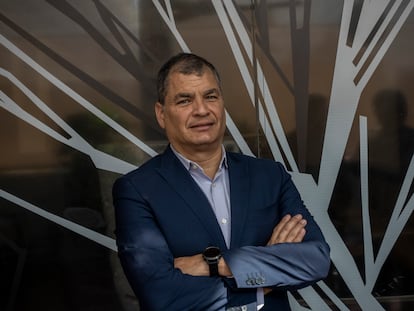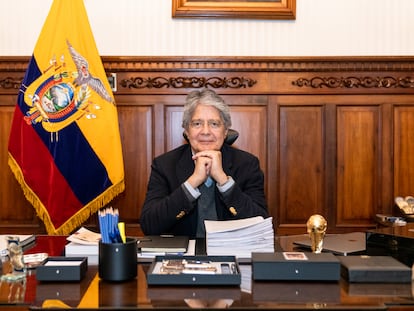Jan Topic, the millionaire businessman vying to emulate Bukele in Ecuador to the sound of ‘Top Gun’
The candidate for the August presidential elections defines himself as an ‘outsider,’ claiming his position is neither left, right nor center

For the first time, Ecuador will see a candidate in the country’s upcoming presidential campaign with a profile that has worked well in other countries, namely that of the outsider. This kind of politician does not define him or herself as being on the political left, center or right, but rather claims to be solely guided by instinct in the midst of the political jungle. Jan Topic, a 40-year-old businessman from Guayaquil, embodies this role, and he is hoping to win Ecuador’s August election for the remainder of the current term, until 2025, following President Guillermo Lasso’s dissolution of parliament and announcement of early elections. The candidate says that he follows a “completely apolitical decision-making scheme” and that he is open to collaboration with any individual or political group that wants to join his platform, whose main focus will be security, mirroring the authoritarian Nayib Bukele in El Salvador.
Three political parties responded to his call: the first is one of the longest-standing political parties in Ecuador, the Social Christian Party (PSC), a right-wing conservative group; the second is the Democratic Center Movement (CD), which until the last elections supported former president Rafael Correa’s candidates; and the last is the Patriotic Society Party (PSP), of former president and military officer Lucio Gutiérrez, who staged a coup in 2000 and resigned in 2005 amidst social and political unrest. Topic has named this alliance Ecuador Sin Miedo (Ecuador Without Fear), which is also his campaign slogan.
Although his candidacy has not yet solidified, and the campaign has not officially kicked off, Topic has already begun touring the country in a helicopter to the soundtrack of Top Gun, wearing boots, pants and camouflage jacket. Topic is touching on the most sensitive issue for Ecuadorians at present, the insecurity affecting the whole country. His resume boasts a multi-million-dollar technology and security company, and he also served as a soldier in the French Foreign Legion, where he was a sniper and paratrooper who served in Ukraine, Syria and Africa. Topic rejects politicians, considering them corrupt, ignorant or not tough enough. He maintains that he will adopt a firm stance against crime, portraying himself as the tough guy who photographs himself with a gun and until recently used this kind of image as his profile picture on his social media channels.
His security proposal focuses on controlling the borders and prisons, bolstering the security forces and a project to ensure that children and teenagers stay in school to prevent them from being recruited by criminal gangs. Topic believes that the axis of security lies in the control of the territory, as he assures that Bukele has done. Topic has expressed his admiration and affinity for the Salvadoran leader. “He has a coherent plan, with a clarity of concepts,” says Topic about the president of El Salvador, whose popularity at home is close to 90% despite the excesses of his strategy and his authoritarian approach that infringe on human rights.
The Bukele approach, in his so-called “war against gangs,” has already resulted in the torture of dozens of individuals, some of them members of criminal organizations and others innocent people who were mistakenly arrested and locked up for months before a court declared their innocence, according to a recent investigation conducted by Cristosal, a civil society human rights organization in El Salvador. When questioned on the subject, Topic says he does not know for certain: “It is possibly true, but I don’t know for sure. What I do know is that since Bukele came to power, the number of homicides per 100,000 inhabitants has dropped from 36 to zero.” And he adds: “He did not back down, he confronted the mafias, he confronted all the political parties, Congress, he did it without backing down.”
He also disagrees with Bukele on some matters. For instance, on the transfer of 6,000 prisoners in one swoop and on the fact that tattoos are a reason why Salvadorans can be accused of belonging to a criminal gang. He says even he himself would be the first to go to prison for having tattoos, but all of this ultimately seems insignificant: “What human right is more essential than life? Nayib Bukele comes in and there are 36 homicides per 100,000 inhabitants, four years later, there are zero. So, the most basic right, the right to life, is being upheld because there are no more homicides.”
When quizzed about those who have been unjustly imprisoned, he responds: “But they are alive, aren’t they?” He says he lacks information on some of the documented cases of deceased prisoners, such as the 153 who died under government protection, arrested in the context of the state of emergency that El Salvador has been under for the past year. Nor does he know about the methods of death caused by asphyxiation, electric shocks, the lack of medical attention and disappearances that Cristosal has documented in detail. In a flight over the Litoral Penitentiary, the most dangerous in Ecuador, Jan Topic issued a warning to the prisoners: “The party is over.”
Sign up for our weekly newsletter to get more English-language news coverage from EL PAÍS USA Edition
Tu suscripción se está usando en otro dispositivo
¿Quieres añadir otro usuario a tu suscripción?
Si continúas leyendo en este dispositivo, no se podrá leer en el otro.
FlechaTu suscripción se está usando en otro dispositivo y solo puedes acceder a EL PAÍS desde un dispositivo a la vez.
Si quieres compartir tu cuenta, cambia tu suscripción a la modalidad Premium, así podrás añadir otro usuario. Cada uno accederá con su propia cuenta de email, lo que os permitirá personalizar vuestra experiencia en EL PAÍS.
En el caso de no saber quién está usando tu cuenta, te recomendamos cambiar tu contraseña aquí.
Si decides continuar compartiendo tu cuenta, este mensaje se mostrará en tu dispositivo y en el de la otra persona que está usando tu cuenta de forma indefinida, afectando a tu experiencia de lectura. Puedes consultar aquí los términos y condiciones de la suscripción digital.










































